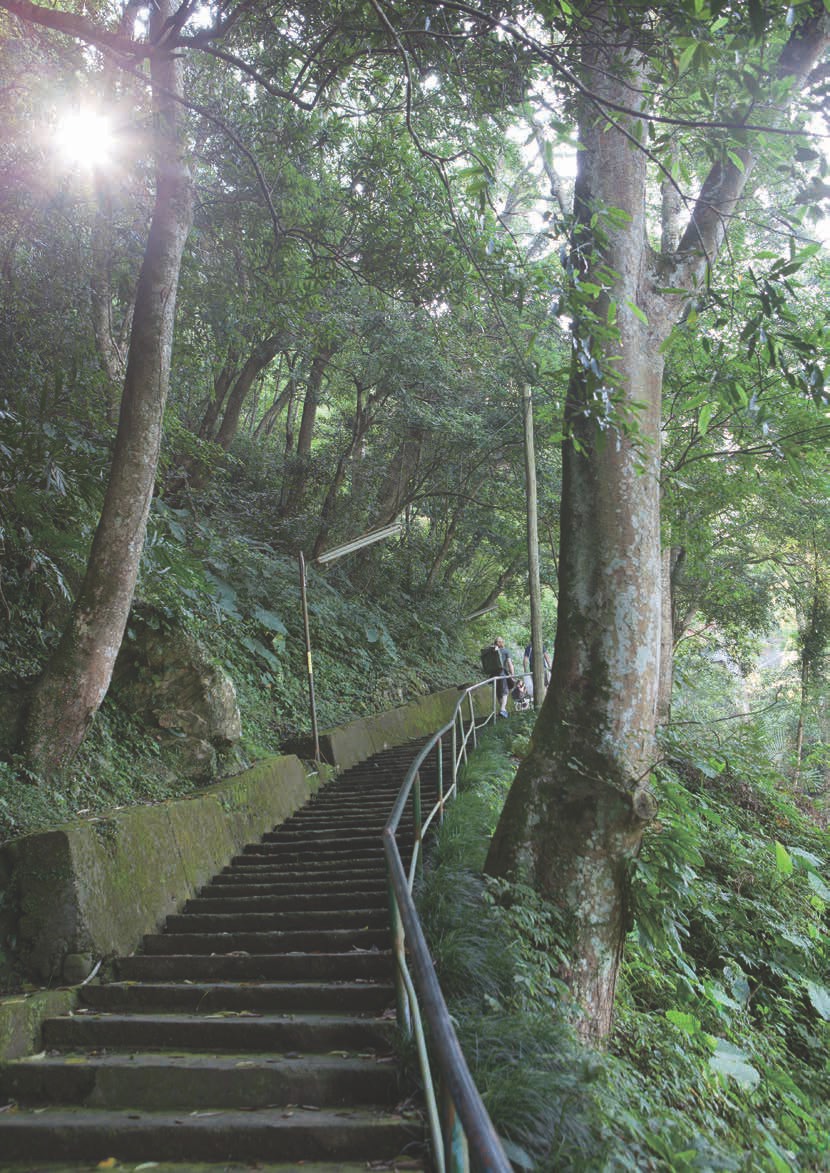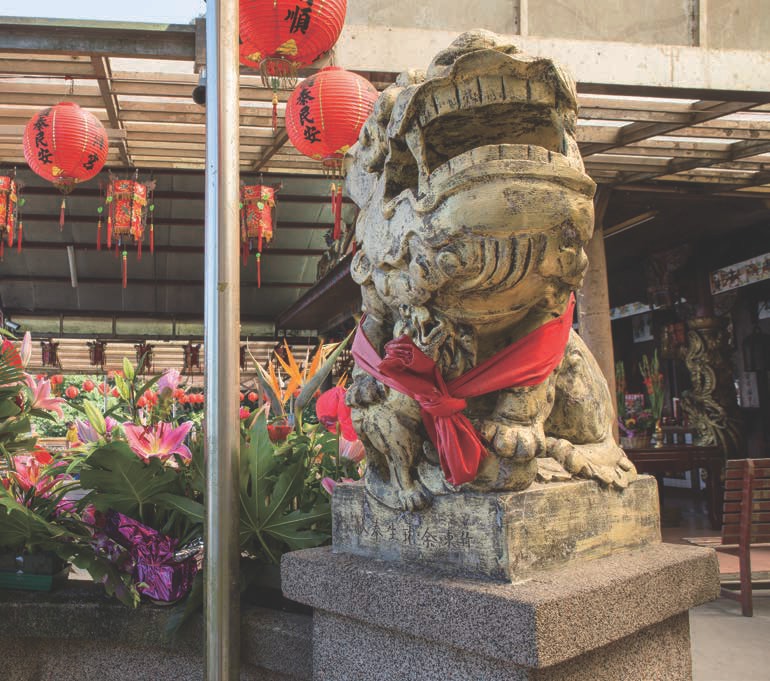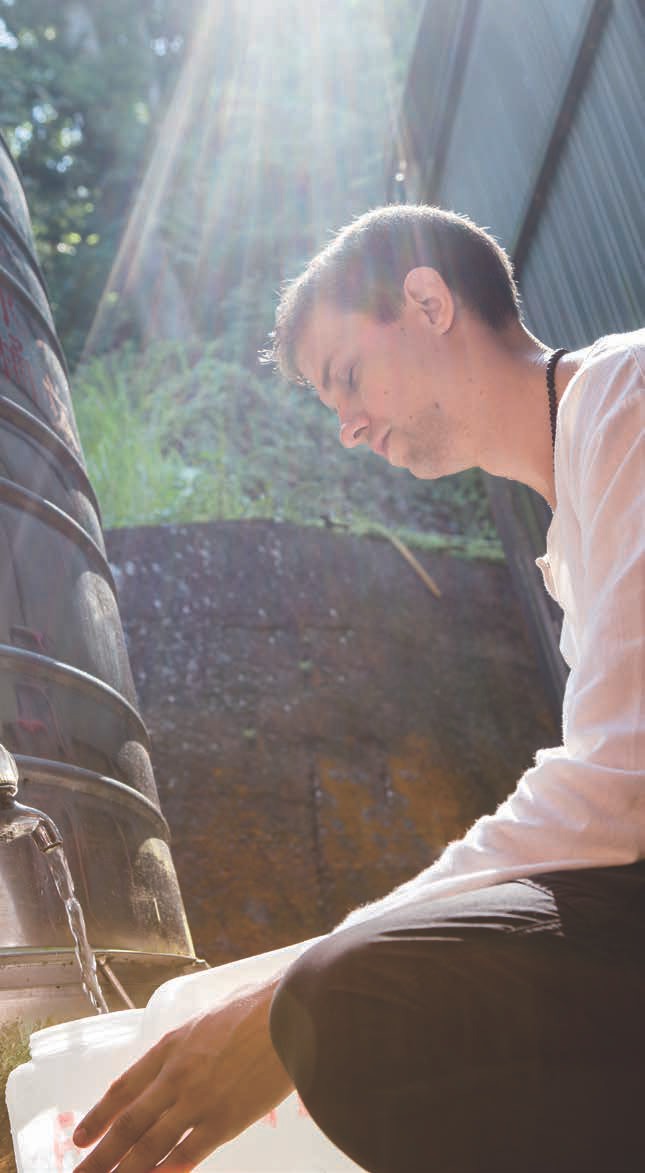
 |
|

I look up at the first set of stairs before me, under a great wall of trees that lead further up the mountain. Setting down my empty container for fetching water, I pause to take a silent, mindful breath before beginning the hike. With a quiet mind, I join the others again, slowly pacing the several hundred steps up the winding stone path, enclosed by lofty pines and arching bamboo. Suspended in the cool morning mist some 1,000 meters up, my mind goes inward.
Only a few minutes in, I find myself thinking over many things. Great life questions pass through my mind; things to figure out, ways to improve myself, lessons to learn... It seems with each step along the worn stone path, I go deeper into reflection. After only a few more steps, I realize that the same familiar thoughts seem to visit me each time I walk up this path. What is it that causes the deeper parts of me to come to the surface? Could it be this mountain? Could it also be the reverence people have brought to this place for many years now?
Walking a little farther, we pass a big-hearted Taiwanese woman with an auntie-like character about her. She booms a strong "hello" and "good morning" to each of us, echoed by a wide, genuine smile, as we walk by with our empty water containers...
At our tea center in Taiwan, each day is punctuated by morning and evening meditation - except for one morning each week, when we head into the mountains to fetch fresh spring water for tea. Packing breakfast and empty water jugs, we share silence during the drive up, still welcoming the meditative mind to start the day. In less than an hour's drive, we arrive at Xian Shan (仙山, "Celestial Mountain") in Shitan Township. The water there is well worth the drive and hike to collect; Wu De often says it's essentially the best water for tea in all of Taiwan, and is the primary reason that our center is situated in Miaoli County.
We often say that we raise a bowl to you, our global tea community, while drinking tea here at the Hut - and it's true! The same can be said about our altars, upon which we regularly set a freshly brewed cup of tea; this tea is also offered to our brothers and sisters around the world, to signify that there is always a hot bowl or cup of tea waiting for you, whenever you should make it to our center or not. Indeed, our Way of Tea at the center is inseparable from this ritual of gathering water at this spring. Wu De began fetching water for tea at Xian Shan twelve years ago. For many of the early years, he would go even twice a week, cradling between his arms a large ceramic urn full of the water. Such urns are quite heavy even when empty; we can only imagine how much more demanding it was to carry water, as we now use metal and plastic jugs that are much lighter! But Wu De relates to the challenging passage each week as an experience that changed not only his tea, but also his life. Constantly engaging both his physical strength and mindfulness for the sake of Tea would call for an alignment of body and mind... of tea and everyday life, of taking the seat at the tea table and walking on the Earth. This is why we treasure this ritual of fetching water; beyond the calm we find on the mountain, or the special water we tap at the spring, we get to connect with our tea much earlier than the moment we pour from our kettle.
When brewing tea, I focus on creating a space of harmony and awakening for myself and my guests sitting before me. When fetching water, I don't even know who will drink it, or in what ways it will serve their hearts, bodies or minds. And I don't need to know. I can bring my mind and body in alignment, knowing that I am taking these steps for Tea itself, for this wonderful Dao that is always a path home to our true selves, unfolding itself in the next hot bowl of tea passed our way...
I keep this in mind when carrying this fresh, magical spring water down the mountain. I know that this water will not only serve those physically at the center this week to enjoy tea; it will also facilitate our practice of Cha Dao here at the Hut, where our cultivation influences hundreds of people around the world. With this in mind, I try to remember there are many joining me on this drive into the mountains, and with each step up the quiet mountain trail...
The road quickly transforms from city streets to country roads, bordered by vibrant flowers and foliage that climb the encompassing valleys.
Stepping out of the car, the air is cooler and mistier than before, and the morning is often blanketed by clouds and mist rolling through. We put on our hiking shoes, and maintain silence as we begin the hike up to the spring. The empty jugs in our hands will be filled with twenty liters of fresh spring water, and brought back down the several hundred steps on the canopied trail.
We often pass people along the way, also coming to visit the temple and sacred spring. Many are locals, though people sometimes travel from all parts of the island to visit the temple and take of the spring water.
People have been coming to Xian Shan for spiritual and healing purposes for over seventy years now, ever since locals spread word of the water's healing properties. As the story goes, a local family in Shitan was stricken with malaria. Living in the mountains several decades ago, the parents and children alike had little options or medical resources to turn to. They had all but resorted to prayer for their solution, until one night, someone in the family had a dream. In it, a spirit told them of a mountain that could heal their illness. At first, they didn't think anything of it, but being so desperate, they decided to ask around. Sure enough, rumors had been spreading among locals of a strange light appearing on a certain mountain, which was thought to be auspicious.
The family eventually came to this place and bowed down to Great Nature herself, humbly asking for a blessing. They lit incense, offered tea, and prayed at this mountaintop, also taking of its heavenly-tasting spring water. Miraculously, after a short time everyone in the family was healed. They attributed this wonder to the mountain, giving full credit to the spring near its peak.
As word spread about this, more people began to come to the humble mountain to pray and take water. In less than ten years, a sizable Daoist temple called Ling Dong Gong (靈洞宮, "Temple of the Spiritual Cave") was constructed in an area slightly lower than the peak, which the spring still fed.

Some years later, large stone steps were laid by hand on the steep slope of the mountain, forming two trails up to where the spring originates, so that the freshest water could be gathered. At the top of the trail, locals constructed a much smaller Daoist shrine to the deity Jiu Tian Xuan Nu (九天玄女, "The Mysterious Lady of the Ninth Heaven"). She was invoked to preside over this temple, called Xie Ling Gong (協靈宮, "Communal Spirit Temple"), and to protect the spring. Xuan Nu is often depicted holding a sword for battle in one hand, and a gourd of the elixir of immortality in the other, symbolizing healing and longevity. As legend has it, she equipped the Yellow Emperor to defeat the warrior god, Chi You in a legendary battle some 4,500 years ago. Maybe she was invoked here for her fierceness, to secure this precious spring that locals have come to revere. Indeed, to this day people bring water down from the steep path by hand to deliver to those who are sick and in need of healing.
Within this temple is a series of sinks and faucets where the spring has been tapped into for people to drink from. Incense, fruit, flowers and other offerings adorn just about every surface in this open-air temple. Statues of the deities worshiped here sit behind their altars, looking out onto a magnificent view that of the valley below, cupped by steep hills and mountains.
Setting down my empty container once again, I bow facing the main altars, feeling gratitude for this sacred place, and join those who erected this temple in revering the Nature before me. I then walk to the edge of the shrine, where the water is fetched. A few sinks fed by the spring are arranged around a large column, along with a small altar to the water itself. Here I bow yet again, connecting with this moment, and why we are here.
I feel stillness in my heart, as I ask for blessings to rain down on our center and the people in this community. I set an intention that our thoughts, actions and speech positively affect all whom we encounter. The idea that water can help fulfill such a wish may sound far-fetched. However, I experience each day how sensitive water is as a medium, especially in this practice of Tea. As a Chajin, and/or reader of this magazine, you are no doubt familiar with the idea of water as a great communicator and container. Far beyond things like taste and flavor, it conveys healing and wisdom on many levels: from Spirit to tree, leaf to brewer, bowl to guest.
Brewing tea, you notice how water carries the flavor and aroma of the Leaf, along with all the characteristics of the teaware and materials it passes through; you experience Qi through this medium of water, further activated by the element of heat. And, maybe you've tried the gongfu experiment where you try drinking the same tea prepared by two different brewers, using the same teaware, water, etc. What ends up in the cup or bowl for our guest is not only the steeped tea, but also our own cultivation in that moment - from the gross to the subtle dimensions, water will convey it all.
After my prayer before the water's altar, I join the others once again. Before rinsing and filling the containers, we each fill up a cup at the sink, and taste the spring today, while looking out towards the valley below. It tastes pure and clean, with the perfect balance of mineral content and hardness-to-softness. Its texture is thick and coating. When I swallow it, it almost disappears like a cloud, without leaving the faintest bit of dryness or pinch in my throat. It was almost as if I was enjoying an amazing tea right in that moment! Indeed, ideal water for tea should exhibit most of the same qualities of a good tea: splashing to the upper palate and coating the mouth pleasantly; moving to the back of the palate on its own, swallowing effortlessly; coating the throat and causing salivation.
Though it changes in interesting ways depending on the weather of a particular week, the water at Xian Shan takes on all of these qualities in an exceptional and undeniable way. I remember my very first hike up the trail to taste this water; after climbing the several hundred stairs on an empty stomach with stiff legs, I could feel how the water immediately penetrated and nourished my body. The very moment I swallowed, it was absorbed and integrated. The feeling was more like breathing fresh mountain air than drinking. Ideal water for drinking - and for brewing tea - should satisfy and nourish in this same way.
After a couple of cups of the pristine water, I set down my mug and proceed to the rear of the sinks where we collect the water for our tea. The empty containers we carried up with us are now rinsed out in the sink, and set on the ground under a couple of taps. Still observing silence, I kneel before my container, alongside another tea brother or sister. We each place our hands on our containers as they fill up with the fresh pure spring water, setting our own intention while the water pours into the silence of the morning. In a shamanistic manner, I ask that each of us here on the mountain may let this water's qualities penetrate our bodies and minds; that we welcome and embody the characteristics of water within ourselves. After all, water is free and unobstructed, happy wherever it finds itself. As it is said in the Dao De Ching:
The supreme good is like water, Which nourishes all things without trying to. It is content with the low places that people disdain, Thus it is like the Dao.
Water is accepting and forgiving, taking the shape of whatever container it is in, and gracefully embracing what enters it. Often referred to as a metaphor for the Dao, water can subtly teach us how to live our lives. And because water can transmit our own energies and states of mind so purely, we can awaken or harmonize others through it.
In our center, our tea water is stored with respect in a special urn that sits right beside us in our meditation room. In this way, not only is our water exposed to the higher vibrations of everyone meditating, but the act of filling up each kettle for tea becomes a meditation as well. Even outside meditation times, we are still moved to bow before entering the meditation room, and to observe silence there. And, before filling up each kettle for our tea sessions, we place our hands on the water urn and send it metta (loving-kindness), along with any other special intention for the tea session. The water responds to all of these things, and in return enhances our tea sessions and the rest of our day!
This is my intention, in one form or another, whenever I go to gather water for all of you:
May our very selves be imbued with those qualities of water, and use this great communicator to share any and all merits that come from our efforts as Chajin and as students of life.
Our particular rituals of fetching water shouldn't discourage you from bringing your own unique ideas and meaning to your tea. You don't need a mountain to hike up, or a famous river or spring to draw from. Even if your water fetching involves heading to the supermarket to collect filtered city water, it can be done thoughtfully and mindfully, and with gratitude. Just the same, storing the water and filling your kettle can be done with similar reverence and attention; in its yielding nature, water will take on the energies that you bring to it. In this way, the purity and sensitivity of water make your tea an extension of your mind and cultivation. No longer is it the water you collected at such and such a place, or a tea you received or purchased from this or that shop - it becomes "your tea", and anyone you serve will take it in for their highest benefit.
May you connect with yourself, others, and Great Nature through your tea sessions. May more and more of the things you do throughout your day become your tea brewing, and may you join us in each step up and down this mountain.

